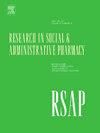Primary care healthcare professionals supporting patients to discontinue antidepressants: A scoping review of barriers, enablers and interventions
IF 3.7
3区 医学
Q1 PUBLIC, ENVIRONMENTAL & OCCUPATIONAL HEALTH
Research in Social & Administrative Pharmacy
Pub Date : 2025-02-08
DOI:10.1016/j.sapharm.2025.02.004
引用次数: 0
Abstract
Background
Antidepressants are prescribed to treat a range of common mental disorders (CMDs) including depression and anxiety. Most people are prescribed antidepressants for longer than is necessary, leading to avoidable long-term side-effects and exacerbated withdrawal effects, if they eventually discontinue taking them. There is a need for interventions to address the barriers and enablers (determinants) of healthcare professionals (HCPs) who support people to discontinue antidepressants when they are no longer needed.
Objective
This scoping review aimed to examine the evidence base regarding the barriers and enablers to HCPs in primary care discontinuing antidepressants prescribed for mild-moderate mental health conditions, as well as interventions to facilitate HCPs to effectively support patients through the discontinuation process.
Methods
Studies were identified by undertaking a keyword search of the databases MEDLINE, Embase, PsycINFO and Cumulative Index to Nursing and Allied Health Literature (CINAHL). All peer-reviewed studies from inception to January 2024 were included. Two reviewers independently screened studies and extracted data. Findings were synthesised narratively.
Results
Two hundred and fifty-three studies were included in title and abstract screening and 30 studies proceeded to full-text screening. Seventeen studies were included; nine reported HCP barriers and/or enablers and eight reported interventions. Time constraints, conflicting priorities and fear of CMD relapse are commonly reported barriers whilst knowledge and skills about how to discontinue antidepressants were the main enablers. Interventions primarily involved education and training for HCPs and provision of information about how to taper antidepressants.
Discussion
Whilst existing interventions address the main enablers to HCPs discontinuing antidepressants, inclusion of components to address the barriers is a notable omission and may explain the lack of efficacy of existing interventions. Future interventions should be developed using appropriate theory and address all determinants of HCPs supporting people to discontinue antidepressants.
支持患者停用抗抑郁药的初级保健保健专业人员:障碍、促进因素和干预措施的范围审查。
背景:抗抑郁药被用于治疗一系列常见的精神障碍(cmd),包括抑郁和焦虑。大多数人服用抗抑郁药的时间超过了必要的时间,如果他们最终停止服用,会导致本可避免的长期副作用和加剧的戒断反应。有必要采取干预措施,解决卫生保健专业人员(HCPs)的障碍和推动因素(决定因素),他们支持人们在不再需要抗抑郁药时停用抗抑郁药。目的:本综述旨在探讨初级保健中HCPs停药的障碍和促进因素,以及促进HCPs在停药过程中有效支持患者的干预措施。方法:通过MEDLINE、Embase、PsycINFO和护理与相关健康文献累积索引(CINAHL)数据库的关键词检索进行研究鉴定。纳入了从开始到2024年1月的所有同行评审的研究。两位审稿人独立筛选研究并提取数据。研究结果以叙述的方式加以综合。结果:253项研究被纳入标题和摘要筛选,30项研究进入全文筛选。纳入了17项研究;9个报告了HCP障碍和/或促进因素,8个报告了干预措施。时间限制、优先事项冲突和对CMD复发的恐惧是常见的障碍,而关于如何停用抗抑郁药的知识和技能是主要的促成因素。干预措施主要包括对医务人员进行教育和培训,并提供有关如何减少抗抑郁药的信息。讨论:虽然现有的干预措施解决了促使医护人员停用抗抑郁药的主要因素,但包括解决障碍的成分是一个明显的遗漏,这可能解释了现有干预措施缺乏疗效的原因。未来的干预措施应采用适当的理论,并解决支持人们停用抗抑郁药的HCPs的所有决定因素。
本文章由计算机程序翻译,如有差异,请以英文原文为准。
求助全文
约1分钟内获得全文
求助全文
来源期刊

Research in Social & Administrative Pharmacy
PUBLIC, ENVIRONMENTAL & OCCUPATIONAL HEALTH-
CiteScore
7.20
自引率
10.30%
发文量
225
审稿时长
47 days
期刊介绍:
Research in Social and Administrative Pharmacy (RSAP) is a quarterly publication featuring original scientific reports and comprehensive review articles in the social and administrative pharmaceutical sciences. Topics of interest include outcomes evaluation of products, programs, or services; pharmacoepidemiology; medication adherence; direct-to-consumer advertising of prescription medications; disease state management; health systems reform; drug marketing; medication distribution systems such as e-prescribing; web-based pharmaceutical/medical services; drug commerce and re-importation; and health professions workforce issues.
 求助内容:
求助内容: 应助结果提醒方式:
应助结果提醒方式:


